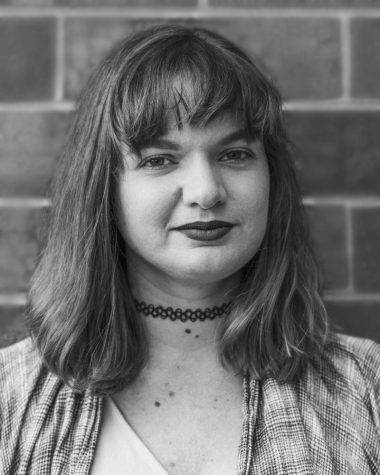‘Jinn’ Brings Fire and Life to Teenage Crisis
Poster for Nijla Mu’min coming-of-age film “Jinn”, which explores black and Muslim identity in today’s political landscape.
March 28, 2018
The beauties that lie within director and writer Nijla Mu’min’s latest film “Jinn” are too many to count. The film follows the life of Summer (Zoe Renee), a high school senior living in California who is trying to deal with her mother’s abrupt conversion to Islam, her anxieties over college and her ever-present exploration of her identity as a black girl and her blossoming sexuality as a teenager.
“Jinn” premiered earlier this month at the 2018 South by Southwest Film Festival in Austin, where it won the Special Jury Recognition for Writing.
Mu’min presents Summer and her companions with such humanity, complexity and honesty that they seem like neighbors who slipped from your memory.
As Summer dips her toes into Islam –– resistant at first, then grudging and finally excited –– she finds the words of the Qur’an beginning to haunt her. As a free-spirited teen with a mother (Simone Missick) whose impulsiveness has come to define her, Summer struggles to overcome prejudice and Islamophobia from friends and neighbors alike, and to follow both her heart and the scripture. Her romance with her Muslim classmate Tahir (Kelvin Harrison Jr.) has all of the wonderful and gut-wrenching action of love in adolescence, though it lacks the melodramatic veneer of other teen films that do not bother with empathy for their protagonists.
Mu’min drew heavily from her own experiences in the Muslim community when writing the film. She was raised in a family where her father was a devout practicer of Islam and her mother was not associated with the religion at all. Though Mu’min herself was raised in the faith, the fact that her mother was not religious and the frequent Islamophobia throughout the United States (and the rest of the world) created a tension within her identity — one that she explores through Summer in “Jinn.”
Summer describes herself as a shapeshifter –– impulsive and deliciously reckless. Her craving for movement is best expressed through dance, though often through the sort of spur-of-the-moment decisions teenagers so often must reckon with later. She is full of love, passion and a burning fire. It is when she learns of the jinn –– a shape-shifting creature formed from fire and air, neither good nor bad but capable of great levels of both –– that she finds what she fears is the Islamic answer for her recklessness.
Summer is always surrounded by color — boldly-patterned head scarves, pastel highlights in her hair, bright eye makeup and loud rooms. Though her bedroom at her mother’s house is decorated in warm reds, pinks and a pillow shaped like a pepperoni pizza, her room at her father’s place is full of lush blues. She alternates staying with each parent, aligning herself with cool and calm tones and wild, heated ones.
Mu’min’s careful and generous writing allows Summer to have the self-confidence and identity crisis that is present in nearly every adolescent, with a special consideration for the difficulties of a black girl reckoning with her relationship to the Islamic faith. Renee’s acting, in turn, fills the character to the brim with a bright and passionate talent, equally perfect in moments of heartbreak and happiness. The entire cast plays out this beautifully unique story with dignity and respect. Not a character is written or acted without justice and care.
“Jinn” gives a story that contains all the vivacity of the Jinn and the beauty of a world where everyone learns to accept each other for who they are.
“Jinn” premiered at SXSW on March 11. It has yet to receive a theatrical release date.
Email Hailey Nuthals at [email protected].























































































































































